The John Beckwith Songbook
To mark the 94th birthday of the composer John Beckwith today, Confluence Concerts has created three 90-minute online recitals featuring the majority of his songs. The recitals were first webcast on YouTube on Sunday, March 7 at 2 pm, 5 pm, and 8 pm EST; they are available for viewing online until March 21st (click here for Concert 1, Concert 2, and Concert 3; the texts are available from the Confluence Concerts website). The event also included videotaped birthday greetings, and interviews by Larry Beckwith (John’s son) with the composer, with the pianist and poet William Aide, and with the singer Mary Morrison. A live chat during the event fostered a sense of community for the hundreds of appreciative audience members listening to the webcast. The congenial hosts for the event were Larry Beckwith and his daughter (and the composer’s granddaughter) Alison Beckwith. Rather than discuss the works in the order they were presented, I will talk about them here in chronological order.
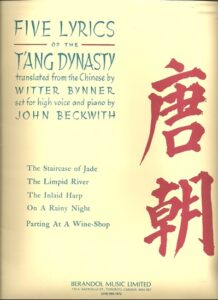 The earliest work performed was Beckwith’s first song cycle, Five Lyrics of the Tang Dynasty, completed in 1947 when the composer was 20 years old. While the composer was self-deprecating about the cycle in his spoken comments, and Mary Morrison noted that she does not usually teach the songs any longer because they are so short and difficult to program, no less an artist than Jon Vickers recorded the cycle for Centrediscs towards the end of his career. On this occasion the cycle was beautifully performed by three young singers from the University of Toronto Faculty of Music, Abigail Sinclair (nos. 1, 2), Ana Isabella Castro (nos. 3, 5), and Alexandra Delle Donne (no. 4), accompanied respectively by Ria Kim, Suzy Smith, and Ivan Jovanovic.
The earliest work performed was Beckwith’s first song cycle, Five Lyrics of the Tang Dynasty, completed in 1947 when the composer was 20 years old. While the composer was self-deprecating about the cycle in his spoken comments, and Mary Morrison noted that she does not usually teach the songs any longer because they are so short and difficult to program, no less an artist than Jon Vickers recorded the cycle for Centrediscs towards the end of his career. On this occasion the cycle was beautifully performed by three young singers from the University of Toronto Faculty of Music, Abigail Sinclair (nos. 1, 2), Ana Isabella Castro (nos. 3, 5), and Alexandra Delle Donne (no. 4), accompanied respectively by Ria Kim, Suzy Smith, and Ivan Jovanovic.
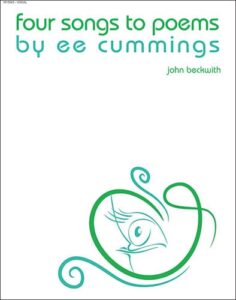 In his memoirs, Beckwith describes the Four Songs to Poems by e. e. cummings (1950) as “student works,” but they were written for the eminent soprano Lois Marshall, who premiered the set at her solo debut recital in Eaton Auditorium on October 12, 1950. Appropriately enough the set was performed by Leslie Fagan, who is a faculty member at Wilfrid Laurier University; during her studies at the University of Toronto, Fagan was a pupil of Marshall. She was accompanied by fellow WLU faculty member Anna Ronai. Beckwith would write a second song cycle to the poetry of cummings thirty years later.
In his memoirs, Beckwith describes the Four Songs to Poems by e. e. cummings (1950) as “student works,” but they were written for the eminent soprano Lois Marshall, who premiered the set at her solo debut recital in Eaton Auditorium on October 12, 1950. Appropriately enough the set was performed by Leslie Fagan, who is a faculty member at Wilfrid Laurier University; during her studies at the University of Toronto, Fagan was a pupil of Marshall. She was accompanied by fellow WLU faculty member Anna Ronai. Beckwith would write a second song cycle to the poetry of cummings thirty years later.
Also dating from 1950 is Two Songs to Poems by Colleen Thibaudeau, consisting of “Serenade” and “The formal garden of the heart”. The year after these songs were composed, Thibaudeau married Beckwith’s friend and frequent collaborator, the writer James Reaney. Both songs received exemplary performances, the first from Russell Braun accompanied by his wife Carolyn Maule, and the second by WLU Associate Dean Kimberly Barber, with Anna Ronai.
In the interview with his son, Beckwith remarked that he is not fond of the term “art song,” finding it “a bit pretentious”. Indeed, few of the works in his catalogue comfortably fit the designation “art song with piano”. There are arrangements of traditional songs, monodramas, songs with other instrumental accompaniment, and so on … but few “art songs” in the traditional meaning of that term. (Mind you, this did not stop the Canadian Art Song Project from co-producing the event.) Beckwith also had interesting observations to make on the subject of setting Canadian English to music, remarks that are pertinent not just to his arrangements of traditional Canadian songs in English, but also to his many settings of lyrics by Canadian poets.
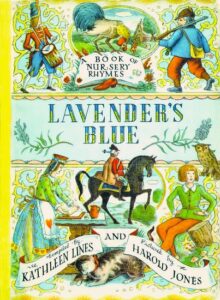 “Never work with children or animals,” W.C. Fields once famously observed, because they will steal the scene. And indeed the children of the Canadian Children’s Opera Company (CCOC) did just that in their performance of Ten English Rhymes (1963). As Larry Beckwith explained, the set was inspired by the beloved collection of nursery rhymes Lavender’s Blue (Oxford University Press 1954), a family favorite. The composer selected ten poems not linked with any traditional tune, and supplied lovely settings for treble voice with piano accompaniment. The seven solos and three duets in the collection were exquisitely sung by thirteen CCOC choristers ranging in age from 8 to 15, accompanied by the CCOC accompanist Christina Faye. Teri Dunn, Larry Beckwith’s wife and the Music Director of the CCOC, was justly proud of the terrific singing of her young charges on this occasion.
“Never work with children or animals,” W.C. Fields once famously observed, because they will steal the scene. And indeed the children of the Canadian Children’s Opera Company (CCOC) did just that in their performance of Ten English Rhymes (1963). As Larry Beckwith explained, the set was inspired by the beloved collection of nursery rhymes Lavender’s Blue (Oxford University Press 1954), a family favorite. The composer selected ten poems not linked with any traditional tune, and supplied lovely settings for treble voice with piano accompaniment. The seven solos and three duets in the collection were exquisitely sung by thirteen CCOC choristers ranging in age from 8 to 15, accompanied by the CCOC accompanist Christina Faye. Teri Dunn, Larry Beckwith’s wife and the Music Director of the CCOC, was justly proud of the terrific singing of her young charges on this occasion.
Beginning in the 1960s, Beckwith turned to making vocal arrangements of traditional Canadian music from diverse cultural groups at the urging of the CBC radio producer John Roberts. The first such set was Four Love Songs for Baritone and Piano (1969), written for Donald Bell. The set includes two songs in English, one in Gaelic and one in Tsimshian. Only the two English songs from the set were given, sung by the young baritone Giovanni Rabito, a Grade 12 student at Unionville High School, where Larry Beckwith is on the music staff. Not only does Rabito have an extraordinarily beautiful voice, he also delivered the stagy humour of “St. John’s Girl” with a deft comedic talent. This is a young singer to keep an eye on.
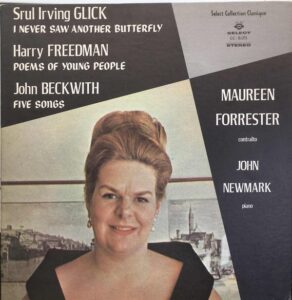 Five Songs from Canadian Traditional Collections (1971) includes texts in French, English, Lithuanian, and Ukrainian to tunes collected by Kenneth Peacock. The set was written for and recorded by Maureen Forrester, accompanied by John Newmark. I acquired the LP not long after it was issued; it was my introduction to the music of Beckwith and remains one of my favorite performances of any of his works. The five song settings are beautifully arranged for the voice with sparkling, imaginative piano accompaniments. Maria Soulis sang the first two songs in the set with superb flair, accompanied by Suzanne Yeo. The last three songs, including the challenging and hilarious cumulative song “L’habitant de Saint-Roch,” were ably taken by Kari Rutherford, a master’s student and pupil of Krisztina Szabó at the University of British Columbia, accompanied by Derek Stanyer.
Five Songs from Canadian Traditional Collections (1971) includes texts in French, English, Lithuanian, and Ukrainian to tunes collected by Kenneth Peacock. The set was written for and recorded by Maureen Forrester, accompanied by John Newmark. I acquired the LP not long after it was issued; it was my introduction to the music of Beckwith and remains one of my favorite performances of any of his works. The five song settings are beautifully arranged for the voice with sparkling, imaginative piano accompaniments. Maria Soulis sang the first two songs in the set with superb flair, accompanied by Suzanne Yeo. The last three songs, including the challenging and hilarious cumulative song “L’habitant de Saint-Roch,” were ably taken by Kari Rutherford, a master’s student and pupil of Krisztina Szabó at the University of British Columbia, accompanied by Derek Stanyer.
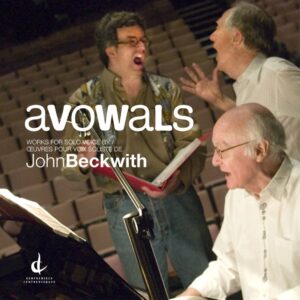 In his interview, Aide remarked that Six Songs to Poems by e.e. cummings (1982) is “one of the best cycles produced by a Canadian composer”. Upon being told of this, Beckwith remarked modestly that Aide was exaggerating, but I am sure many would agree with Aide, including the numerous baritones who have this work in their repertoire. It is extraordinary how aptly Beckwith captures not only the deeper meaning of these six poems, but also their idiosyncratic syntax and form. The set has been beautifully recorded by the baritone Doug MacNaughton with Aide for Centrediscs; the cover of that CD, pictured here, captures a telling moment of the rehearsal process. The fine bass-baritone Giles Tomkins sang the second and fifth songs of the set, accompanied by his wife Kathryn Tremills. The other songs were nicely rendered by the upcoming young singers Cameron Martin (nos. 1, 3, 4) accompanied by Suzy Smith, and Clarence Frazer (no. 6) with veteran collaborative pianist Michael McMahon.
In his interview, Aide remarked that Six Songs to Poems by e.e. cummings (1982) is “one of the best cycles produced by a Canadian composer”. Upon being told of this, Beckwith remarked modestly that Aide was exaggerating, but I am sure many would agree with Aide, including the numerous baritones who have this work in their repertoire. It is extraordinary how aptly Beckwith captures not only the deeper meaning of these six poems, but also their idiosyncratic syntax and form. The set has been beautifully recorded by the baritone Doug MacNaughton with Aide for Centrediscs; the cover of that CD, pictured here, captures a telling moment of the rehearsal process. The fine bass-baritone Giles Tomkins sang the second and fifth songs of the set, accompanied by his wife Kathryn Tremills. The other songs were nicely rendered by the upcoming young singers Cameron Martin (nos. 1, 3, 4) accompanied by Suzy Smith, and Clarence Frazer (no. 6) with veteran collaborative pianist Michael McMahon.
The monodrama Avowals (1985), to a text by bpNichol, is about the existential crisis of a pop singer. Aide observed that it is a difficult work for the keyboard player to practise, as it calls not just for piano, but also harpsichord and celeste; often two of the instruments must be played simultaneously. The CD pictured above features a superb recording of the work by the University of Victoria tenor Benjamin Butterfield, accompanied by Aide. Butterfield gamely agreed to reprise Avowals for the Confluence Concerts event, partnered by Robert Holliston, Head of Keyboard at the Victoria Conservatory of Music.
Whatever else Stacey (1997) might be, it certainly is not an “art song”. In his memoirs, Beckwith refers to it as a “sung monologue or one-character mini-opera”. It is a much-loved classic of the Canadian music repertoire, and has been recorded by Monica Whicher (twice), Caroline Schiller, and Teri Dunn. The text, consisting of six selections from Margaret Laurence’s novel The Fire-Dwellers, tells of another existential crisis: Stacey MacAindra vents her feelings about life as a 1960s suburban Vancouver housewife in a series of wryly humorous and poignant monologues directed at God. The six sections of the 15-minute monodrama were divided up among three gifted University of Toronto graduate students, the sopranos Elizabeth Legierski (nos. 1, 2), Morgan Reid (3, 4), and Heidi Duncan (5, 6), all from the studio of Darryl Edwards; they were accompanied respectively by Kathryn Tremills, Christopher Mokrzewski, and Andrea Grant.
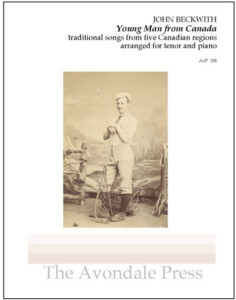 The set of five arrangements of Canadian traditional songs titled Young Man from Canada (1998) features texts in Gaelic, Hungarian, English and French. This was the opening selection of the first of the three concerts, and was jointly performed by the tenors Colin Ainsworth (nos. 1, 2, 4 accompanied by the versatile University of Manitoba pianist Laura Loewen) and Jacob Abrahamse (nos. 3, 5 accompanied by Kathryn Tremills). Ainsworth and Loewen are old hands at virtual performing, having worked together on a series of online collaborations called “Iso-recitals.” Bookending the event, the set of four arrangements for soprano and piano titled I Love to Dance (1999) ended the third recital. The set features lyrics in English, Russian, German, and French. Patricia Wrigglesworth, a first-year student at Western University, took the first song, accompanied by Marianna Chibotar. Natalya Gennadi sang the heartbreaking second song in Russian, accompanied by Kathryn Tremills; this performance also featured a very beautiful and artistic video. The celebrated Canadian soprano, conductor, and new music specialist Barbara Hannigan sang the third song with impeccable German diction, and also accompanied herself at the piano. The set concluded with the fine young University of Toronto soprano Gabrielle Turgeon singing “La danse” accompanied by her mother, Anne-Louise Turgeon.
The set of five arrangements of Canadian traditional songs titled Young Man from Canada (1998) features texts in Gaelic, Hungarian, English and French. This was the opening selection of the first of the three concerts, and was jointly performed by the tenors Colin Ainsworth (nos. 1, 2, 4 accompanied by the versatile University of Manitoba pianist Laura Loewen) and Jacob Abrahamse (nos. 3, 5 accompanied by Kathryn Tremills). Ainsworth and Loewen are old hands at virtual performing, having worked together on a series of online collaborations called “Iso-recitals.” Bookending the event, the set of four arrangements for soprano and piano titled I Love to Dance (1999) ended the third recital. The set features lyrics in English, Russian, German, and French. Patricia Wrigglesworth, a first-year student at Western University, took the first song, accompanied by Marianna Chibotar. Natalya Gennadi sang the heartbreaking second song in Russian, accompanied by Kathryn Tremills; this performance also featured a very beautiful and artistic video. The celebrated Canadian soprano, conductor, and new music specialist Barbara Hannigan sang the third song with impeccable German diction, and also accompanied herself at the piano. The set concluded with the fine young University of Toronto soprano Gabrielle Turgeon singing “La danse” accompanied by her mother, Anne-Louise Turgeon.
The Three Songs to Poems by Miriam Waddington originated in 2000 as a setting of “A Man and His Flute” and was completed with the addition of two further poems, “Old Chair Song” and “The Snow Tramp” in 2003, a year before Waddington’s death. The songs were performed by three young Canadian sopranos all on the cusp of promising careers: Sara Schabas of Toronto, currently based in Geneva (accompanied by Valerie Dueck), Nova Scotia native Allison Angelo (with Andrea Grant, piano), and Alberta-born Caitlin Wood (with Kathryn Tremills).
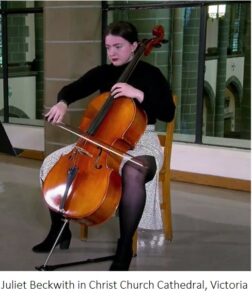 Two works from 2008 were heard in performances with the singer simultaneously providing the instrumental accompaniment. In the three Beckett Songs for baritone and guitar, the Irish writer’s sparse lyrics are beautifully captured in music by Beckwith. Doug MacNaughton, who commissioned the work, gave an absolutely spellbinding performance of the short cycle. Play and Sing is a suite of eight short pieces, five for cello solo, two for voice and cello, and one for voice alone. The charming set was written for the composer’s granddaughter Juliet Beckwith as a gift for her ninth birthday. The work is a wonderful tribute to the confidence that the composer had in his young granddaughter’s mature musicianship. The three texted pieces feature lyrics by the composer which comment amusingly on the music (“This is double counterpoint, in case you didn’t know”). The superb performance was beautifully filmed in Christ Church Cathedral, Victoria, where Juliet is now a chorister, following in the footsteps of her great-grandmother and her grandfather, both of whom sang in the same church choir many decades ago.
Two works from 2008 were heard in performances with the singer simultaneously providing the instrumental accompaniment. In the three Beckett Songs for baritone and guitar, the Irish writer’s sparse lyrics are beautifully captured in music by Beckwith. Doug MacNaughton, who commissioned the work, gave an absolutely spellbinding performance of the short cycle. Play and Sing is a suite of eight short pieces, five for cello solo, two for voice and cello, and one for voice alone. The charming set was written for the composer’s granddaughter Juliet Beckwith as a gift for her ninth birthday. The work is a wonderful tribute to the confidence that the composer had in his young granddaughter’s mature musicianship. The three texted pieces feature lyrics by the composer which comment amusingly on the music (“This is double counterpoint, in case you didn’t know”). The superb performance was beautifully filmed in Christ Church Cathedral, Victoria, where Juliet is now a chorister, following in the footsteps of her great-grandmother and her grandfather, both of whom sang in the same church choir many decades ago.
 Singing Synge (2011) offers monologues from three different plays of the early 20th century by the Irish playwright John Millington Synge in dramatic settings (“character studies” the composer calls them in his memoir) for baritone and piano. This set was also written for MacNaughton, who gave the first performance with William Aide at the Arts and Letters Club in Toronto on February 13, 2012. On this occasion the set was performed by the New Zealand baritone Bradley Christensen, a DMA student at the University of Toronto, with Trevor Chartrand at the piano. Christensen is working on a doctoral thesis that will offer a pedagogical guide to the song repertoire of Beckwith (excluding the arrangements); a short video about his research is available on the Confluence Concerts YouTube channel here.
Singing Synge (2011) offers monologues from three different plays of the early 20th century by the Irish playwright John Millington Synge in dramatic settings (“character studies” the composer calls them in his memoir) for baritone and piano. This set was also written for MacNaughton, who gave the first performance with William Aide at the Arts and Letters Club in Toronto on February 13, 2012. On this occasion the set was performed by the New Zealand baritone Bradley Christensen, a DMA student at the University of Toronto, with Trevor Chartrand at the piano. Christensen is working on a doctoral thesis that will offer a pedagogical guide to the song repertoire of Beckwith (excluding the arrangements); a short video about his research is available on the Confluence Concerts YouTube channel here.
The most recent music heard was the brief cycle Four Short Songs (2014), a setting for medium voice and piano of surreal texts from the 1912 book of poems titled Klänge [“Sounds“] by the artist Wassily Kandinsky, translated from the original German into English by Elizabeth Napier. The set is dedicated to Daniel Weinzweig, who helped to fund this event, as did Vern and Elfrieda Heinrichs and the Koerner Foundation. It was performed by the excellent Hungarian-Canadian mezzo-soprano Krisztina Szabó, who became an assistant professor at the UBC School of Music at the start of this academic year. She was accompanied by Derek Stanyer. [A year after this performance, Szabó made a video recording of this song cycle with the pianist Steven Philcox for the Canadian Art Song Project in honour of Beckwith’s 95th birthday; it can be viewed here.]
This ambitious undertaking was a first-class production on every level. All of the musicians, from the youngest CCOC chorister to the most seasoned professionals, sang and played with insight, understanding, and dedication. The audio and video mixes by Ryan Harper were superb; he took what was no doubt a very disparate set of recordings and created a unified, high quality webcast that was a pleasure to view and hear from start to finish. The production of the text files and the overall coordination of the project was an immense undertaking. Hats off to the remarkable Larry Beckwith for envisioning this event in the midst of the COVID-19 pandemic and bringing it to such a successful conclusion. And finally, kudos, bravo and much love to John Beckwith, whose creative genius was the cause for this wonderful celebration. Happy 94th birthday, John … you are an inspiration to us all.